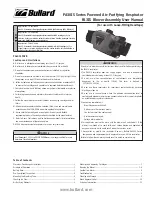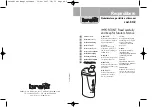
PA30IS Series Powered Air-Purifying Respirator
PA3IS Blower Assembly User Manual
(for use with Loose-Fitting Headtops)
www.bullard.com
PA30IS PAPR
Cautions and Limitations
A. Not for use in atmospheres containing less than 19.5% oxygen.
B. Not for use in atmospheres immediately dangerous to life or health.
C. Do not exceed maximum use concentrations established by regulatory
standards.
F. Do not use respirator if airflow is less than four cfm (115 lpm) for tight fitting
face pieces or six cfm(170 lpm) for hoods and/or helmets.
H. Follow established cartridge and canister change schedules or observe ESLI
to ensure that cartridges and canisters are replaced before breakthrough.
I. Contains electrical parts that may cause an ignition in flammable or explosive
atmospheres.
J. Failure to properly use and maintain this product could result in injury or
death.
L. Follow the manufacturer’s user instructions for changing cartridges and/or
filters.
M. All approved respirators shall be selected, fitted, used and maintained in
accordance with MSHA, OSHA and other applicable regulations.
N. Never substitute, modify, add or omit parts. Use only exact Bullard
replacement parts in the configuration as specified by the manufacturer.
O. Refer to User’s Instructions and/or maintenance manuals for information on
use and maintenance of these respirators.
P. NIOSH does not evaluate respirators for use as surgical masks.
NOTICE
As of November 1, 2013, the PA30IS PAPR Blower is no longer certified for use in
Hazardous Classified Locations.
Use strictly in accordance with instructions, labels and limitations pertaining to
the PA30IS respirator.
1. The PA30IS respirator does not supply oxygen. Use only in adequately
ventilated areas containing at least 19.5% oxygen.
2.
Do not use when concentrations of contaminants are immediately
dangerous to life or health (IDLH). This term is defined in
29CFR 1910.134 (b).
3. Do not use these respirators for respiratory protection during abrasive
blasting or clean up.
4. Do not use in circumstances where the airborne concentration level of
contaminant exceeds maximum use concentration for this type of respirator
as established by regulatory standards.
5. Leave area immediately if:
• Breathing becomes difficult
• Dizziness or other distress occurs
• You taste or smell the contaminant
• Unit becomes damaged
• Voltage alarm activates
6. This apparatus must not be worn with the blower unit switched off. If the
blower is switched off, a rapid build-up of carbon dioxide and depletion of
oxygen may occur, which could result in death or serious injury.
7. Never alter or modify this respirator. Use only Bullard PA30IS Series
components and replacement parts approved for use with this respirator.
Failure to follow these warnings could result in death or serious injury.䍃
WARNING
Warnings, Cautions and Limitations .................................................................... 1
Principle of Operation ......................................................................................... 2
Battery Pack ......................................................................................................... 2
Pre-Operational Inspection .................................................................................. 3
Mounting the Breathing Tube ................................................................................ 3
Checking Air Flow ................................................................................................. 3
Air-Purifying Elements ......................................................................................... 4
Mounting and Replacing Cartridges ..................................................................... 5
Donning the Blower .......................................................................................... 5-8
Low Battery Alarm ............................................................................................... 8
Troubleshooting .................................................................................................... 8
Cleaning and Storage ............................................................................................ 9
Niosh Approval Label .......................................................................................... 10
Ordering Information .......................................................................................... 11
NIOSH
Approval No. TC-21C-0825
PA3IS - Powered Air-Purifying Respirator with High Efficiency (HE) Filters (2)
Approval No. TC-23C-2306
PA3IS - Powered Air-Purifying Respirator with PA3NBC cartridges (3) for
chlorine, hydrogen chlorine, sulfur dioxide, chlorine dioxide, hydrogen fluoride,
ammonia, methylamine, and particulates
Approval No. TC-23C-2384
PA3IS - Powered Air-Purifying Respirator with OV-AG-HE Cartridges (3) for
organic vapors, chlorine, hydrogen chloride, sulfur dioxide, chlorine dioxide or
hydrogen fluoride and particulates
Table of Contents





























